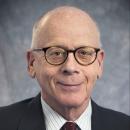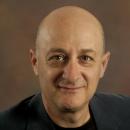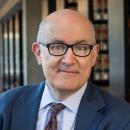Ronald Coase Honored at Lecture Series
Usually, the lecture series dubbed “Chicago’s Best Ideas” is a forum for the new research of current faculty. That’s why Professor Saul Levmore joked that he planned to open this season of presentations with one of his own “Chicago’s mediocre ideas.” But that was before Nobel Prize-winning economist and longtime Law School professor Ronald Coase died on September 2, and Levmore decided to use his lecture slot to pay tribute. It was an appropriate setting; Coase was the father of what “was probably Chicago’s biggest and best idea ever,” Levmore said.
That idea was what is known as the Coase Theorem. Roughly stated: In a world where there are no transaction costs, an efficient outcome will occur regardless of the initial allocation of rights.
“It is such fun to introduce some of Coase's ideas to a new audience,” Levmore said after his talk. “No sooner do people think they understand bargaining in the shadow of law, then they jump to questions about how bargaining occurs, how wealth might matter, how legal rules themselves are a form of wealth, and so much more. I try to expand their thinking into new realms – like imagining all of modern China as a Coasian bargain – and I bet Ronald would have loved that, or at least argued with it.”
Levmore spent his talk describing the theorem, its real-world applications, and Coase’s legacy. Essentially, Coase revealed that people can bargain around legal rules (laws), and because of this the original rule or allocation of rights might not matter to the outcome.
For example, a factory that pollutes the air in a residential neighborhood might be regulated by laws that say how much it can pollute or what it must provide to the neighbors as compensation. But, if those outcomes are not the most efficient, Coase taught, some other result will occur instead. Maybe the factory is forbidden by law to operate near homes, so it will offer homeowners money to purchase and demolish their homes. Maybe the factory is permitted by law to exist, but the neighbors hate it, so they pay the factory to go away. The outcome does not always follow from the law if transaction costs are low, which means if circumstances make bargaining possible.
“The rule is just a starting point for a bargain,” Levmore said, citing many examples of where the Coase Theorem can be a lens on bargaining, from union strikes to restaurant inspections to children’s bedtimes. “It’s so simple and profound that at first you don’t believe it’s true.”
And, Levmore added, many didn’t believe it. Coase’s big idea was slow to catch on with economists and lawyers, who found it at first counterintuitive and then almost too obvious.
“The more you come to love Coase, the more you come to see the world as about bargains, the more you come to understand law that way, in a way the more you come to be proud that you are at a law school where Coase uttered these words,” Levmore said. “You begin to see, Coase is everywhere in our lives.”
And his work, while decades old, continues to raise new questions about law and economics, such as why people don’t bargain even more, Levmore added. “There’s no end to those questions, and I see all of that as part of the legacy of the Coase Theorem as well.”
Levmore touched on Coase’s other work, such as his theory of the firm, which looked at how firms are organized and why some work is performed inside the firm and some contracted out (the “make or buy” question). He also mentioned Coase’s deep interest in the rise of capitalism in China, which culminated with his 2012 book with Ning Wang, “How China Became Capitalist.”
Student Maria Macia said Coase’s ideas have loomed large in her schoolwork. She’s a joint JD/PhD in Economics, and she has learned Coase both in the Law School and in her classes across the Midway. She’s very proud of going to this particular law school in part because of Coase, she said.
“I love being able to say I attend a law school with Nobel Prize-winning economists on the faculty, such as Ronald Coase,” Macia said. “And even though Professor Coase has died, he lives on here. His legacy is such a part of this school.”
Coase's legacy will be honored throughout the year in several events and publications planned by the Coase-Sandor Institute for Law and Economics. His colleagues are contributing to a book of personal essays about his work, which will be titled “Coase's Legacy.” The University of Chicago Press Journals Division will publish a Coase Casebook in ebook format, which will get his work into the hands of even more students of law and economics. The November issue of The Journal of Law and Economics will reprint his articles, “The Problem of Social Cost” and “The Federal Communications Commission.” And the spring issue of the Record, the alumni magazine, will pay tribute to Coase as well.
In September, the University of Chicago Center in Beijing held a conference in Coase's honor, attended by LLMs, JSDs, and graduates of the Law and Economics Summer School. Professor Omri Ben-Shahar, Kearney Director of the Coase-Sandor Institute, taught at the conference.
In the spring, colleagues and friends who knew him best will speak on a panel, telling personal stories about Coase. Also next year, Professor Richard McAdams will present the annual Coase Lecture.


